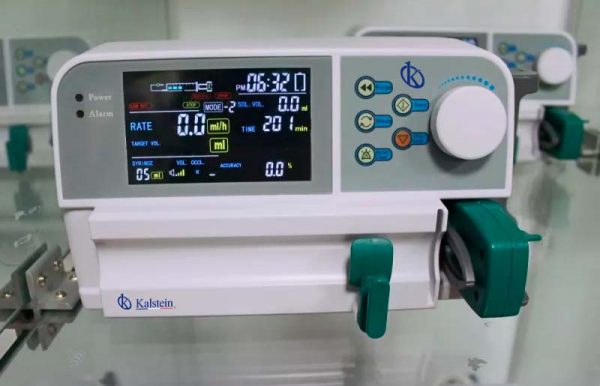An infusion pump is medical equipment used in clinics and hospitals to mobilize fluids such as solutions, drugs, blood and blood derivatives through a connector into the patient’s circulatory torrent, thus facilitating precise parenteral administration of drugs and solutions.
These devices have a built-in software that helps to avoid errors in the administration of drugs, since they are mainly used in conditions where precision and a constant supply of a drug or medicine is essential.
Advantages of the use of infusion pumps
An infusion pump is used to administer drugs and solutions at high pressures that could not be achieved with other equipment operated manually or severely dependent, such as during the administration of intra-arterial drugs, or very fast flows of solutions during resuscitation (200-1000 ml/h). Among the most notable advantages of its use are:
- Its use decreases the percentage of human errors in the intravenous supply of drugs
- They provide a more accurate drip rate than gravity systems via a flow-regulating clamp.
- They save nursing staff time, because with the use of pumps it is not necessary to regulate the flow of the drip.
- They allow all kinds of solutions, blood and its derivatives, drugs and parenteral and enteral infusions to be administered. Adaptable to the needs of the patient, some of them are portable.
Operation of an infusion pump
Infusion pumps allow you to program the volume of medicine or solution you want to infuse and issue an alarm as soon as this volume is reached, if the medicine or solution is not finished. Some infusion pumps can handle several solutions simultaneously and independently. When a pump handles two or more solutions with independent infusion controls, it has two or more channels.
Its operation is based on using mechanical pressure to overcome the resistance to flow. The infusion pumps are programmed to generate pressure on the injected line in the patient. They are able to move the medicine or solution from the external environment to the patient’s circulatory torrent.
Basic care and recommendations for the use of infusion pumps
- Keep it connected to the electric current.
- First clean using a cloth with detergent, then pass it through the outside, and then pass a cloth with alcohol at 70%.
- Place it on a secure stand.
- Handle it with care and dedication.
- Check the correct condition of the equipment, assembly and operation of cables, serum bags, administration set and syringes.
- Carry out the functional and calibration controls of the equipment.
- Control settings for controls and alarms.
- Check that the correct infusion rate has been indicated.
Maintenance of infusion pumps
Because infusion pumps are used to infuse liquids, many of these substances oxidize or degrade equipment, so preventive maintenance activities, an internal cleaning followed by external cleaning, are necessary. Among the recommendations for the maintenance of infusion pumps we can mention:
- Chassis: examine the exterior of the equipment, the cleanliness and general physical conditions.
- Assembly and support: Review the integrity of the cart, table, or stand where the equipment is placed.
- Brakes: check the operation of the brakes on the cart or the paral where the equipment is to be located.
- Browse the network plug.
- Verify the network cable
- Check the battery condition.
What does Kalstein offer you?
Kalstein a company MANUFACTURER of medical and laboratory equipment of the highest quality and the best technology at the best PRICES in the market, so you can make your PURCHASE with us, knowing that you have the service and advice of a company specialized in the field and committed to provide you with safe, economical and effective options for the performance of your functions in the right way. In this opportunity we present our Infusion Pump YR05164, novel infusion pump has the following characteristics:
- Type of drip pumping.
- Large LCD display, with backlight, suitable for working in various ambient light conditions.
- Disposable intravenous equipment of any brand is suitable for this pump
- Three working modes: rate/volume/time mode
- Purge, KVO function
- The heating function is optional, suitable for infusing in winter or if there is a requirement for the temperature of the drug.
- The central monitoring system is optional, the infusion status of each pump is displayed in real time at the central station via wireless transmission.
- Simple and convenient in operation, intuitive presence of working state.
- Audible and Visible Alarms.
- Alarm: Full infusion, vacuum, faulty signal, malfunction, occlusion, door open, air bubble, low battery, setup error, AC power off, idle.
That’s why we invite you to take a look at: HERE

